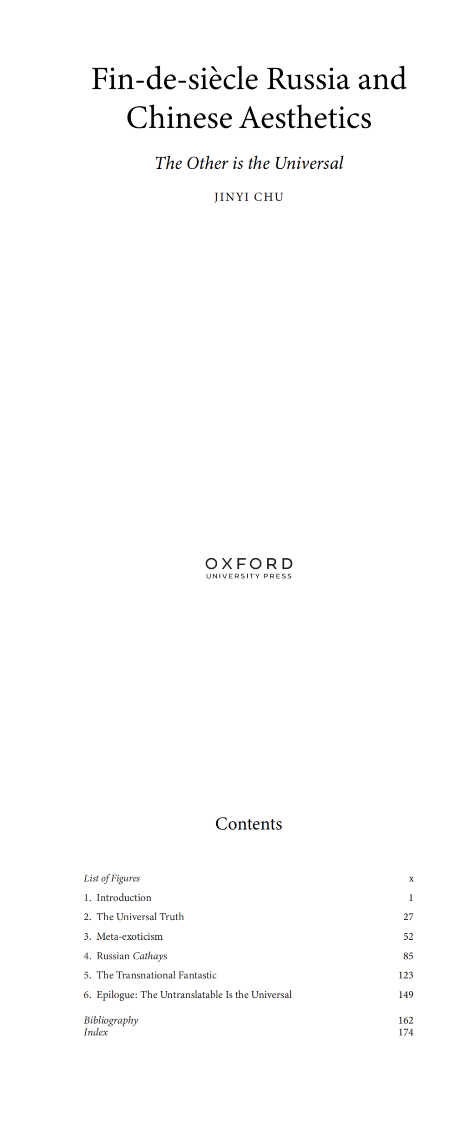作者:初金一 发布时间:2024-09-23 来源:复旦大学中华文明国际研究中心+收藏本文
《Fin-de-siècle Russia and Chinese Aesthetics: The Other is the Universal》
(世纪末俄国与中国美学)
作者:初金一
出版社:牛津大学出版社
出版时间:2024年
ISBN: 9780198920397

初金一,耶鲁大学斯拉夫语言文学系助理教授,麦克米兰国际中心欧洲研究理事会和东亚研究理事会研究员,斯坦福大学博士,上海外国语大学硕士、学士,复旦大学中华文明研究中心、俄罗斯科学院俄罗斯文学研究所访问学者。主要研究方向为俄国现代主义、俄国诗歌,翻译研究、社会主义文化、中俄文化关系等;发表有中英文文章二十余篇;译有《陀思妥耶夫斯基传》《<日瓦戈医生>出版记》等。
初金一老师于2021年3月至2021年8月在复旦大学中华文明国际研究中心从事访问研究。本书是初金一老师在中心访问期间研究成果之一。

Like their European counterparts, Russian modernism also flourished in a sustained dialogue with China. In Fin-de-siècle Russia and Chinese Aesthetics, Jinyi Chu reconsiders Russia’s place in the genealogy of global modernism and argues that fin-de-siècle Russian ideas about increasing global cultural and socioeconomic interconnectedness emerged from unsettling encounters with China. Drawing on literary texts, paintings, advertisements, official documents, and archival sources, Chu reconstructs an array of surprising stories about Russo-Chinese cultural interactions, from Innokenty Annensky’s encounter with a Tibetan monk in Paris, Aleksei Remizov’s adaptations of Chinese ghost stories, and Lev Tolstoy’s translations of the Daoist canon, to Ilya Mashkov’s fauvist painting of a Chinese fairy. Fin-de-siècle Russia and Chinese Aesthetics moves beyond the idea that Russian literary and artistic representations of China were simply manifestations of Russia’s Eurasian cultural identity. Instead, Chu shows that literature and art actively renegotiated and destabilized the preconceived world order at a time when China shifted from Russia’s rival in Inner Asia to a target in the competition among global imperialist powers.
参考译文:
与欧洲现代主义一样,俄罗斯现代主义的发展也在与中国文化的持续对话中展开。在《世纪末俄国与中国美学》一书中,初金一借此重新审视了俄罗斯在全球现代主义谱系中的地位。从托尔斯泰的《道德经》翻译到安年斯基在巴黎吉美博物馆与佛教高僧的相遇,从巴尔蒙特、古米廖夫、马尔科夫等人的中国诗集,到列米佐夫的聊斋改写,再到伊利亚·马什科夫所绘制的中国仙女,本书借助文学作品、绘画、广告、官方文件和档案资料,重构了一系列中俄文化交流史中的奇妙故事。《世纪末俄国与中国美学》质疑了俄罗斯文学和艺术对中国的描绘表现了俄罗斯欧亚文化认同的观点,并试图表明,这些世界末俄国的中国作品反而表现出一种文学与艺术动摇既定世界秩序想象的尝试。
“Erudite and original, this book will make a serious contribution to our understanding of Russian modernism in its self-reflexive dialogue with Chinese culture. In addition to fine-grained philological analysis, the reader would encounter some exciting detective work that uncovers significant yet so far overlooked intellectual affinities.”
——Galin Tihanov, Queen Mary University of London
“With his deep knowledge of Chinese and Russian culture, Jinyi Chu is uniquely qualified to explore the modernist “invention of China” in fin-de-siècle Russia. His book offers fascinating insights into the work of major Russian novelists and poets through his innovative interpretive lens of meta-exoticism.”
——Adrian Wanner, Pennsylvania State University
“Pushing beyond the Orientalist paradigm, Fin-de-siècle Russia and Chinese Aesthetics reframes the Russian modernist engagement with Chinese aesthetics as a search for an expanded sense of universalism that could overcome the false universality of a Eurocentric cultural order. Linguistically dexterous and intellectually daring, with a methodological range that encompasses religious philosophy, aesthetic theory, scrupulous philology, and translation analysis, Jinyi Chu's book makes a major contribution to our understanding of modernism as well as the cultural history of the Sino-Russian relationship.”
——Edward Tyerman, University of California, Berkeley
参考译文:
“这本书博学且富有创意,将为我们理解俄国现代主义在与中国文化的自省对话中做出重要贡献。除了细致入微的语文学分析外,读者还将遇到一些令人兴奋的侦探工作,揭示了迄今为止被忽视的重要智识联系。”
——加林·蒂哈诺夫,伦敦玛丽女王大学
“凭借对中国和俄罗斯文化的深入了解,初金一具有独特的资格来探索世纪末俄国现代主义对‘中国的发明’。他通过创新性的元异域阐释视角,为重要俄国小说家和诗人的作品提供了引人入胜的见解。”
——阿德里安·万纳,宾夕法尼亚州立大学
“《世纪末俄国与中国美学》突破了东方主义范式,将俄国现代主义同中国美学的互动解释为寻求普遍性意识扩张的努力,从而克服欧洲中心文化秩序的虚伪的普遍主义。作者语言能力上娴熟、思想上大胆,方法上涵盖了宗教哲学、美学理论、严谨的语文学和翻译分析,这本书为我们理解现代主义以及中俄文化关系史做出了重大贡献。”
——爱德华·泰尔曼,加州大学伯克利分校